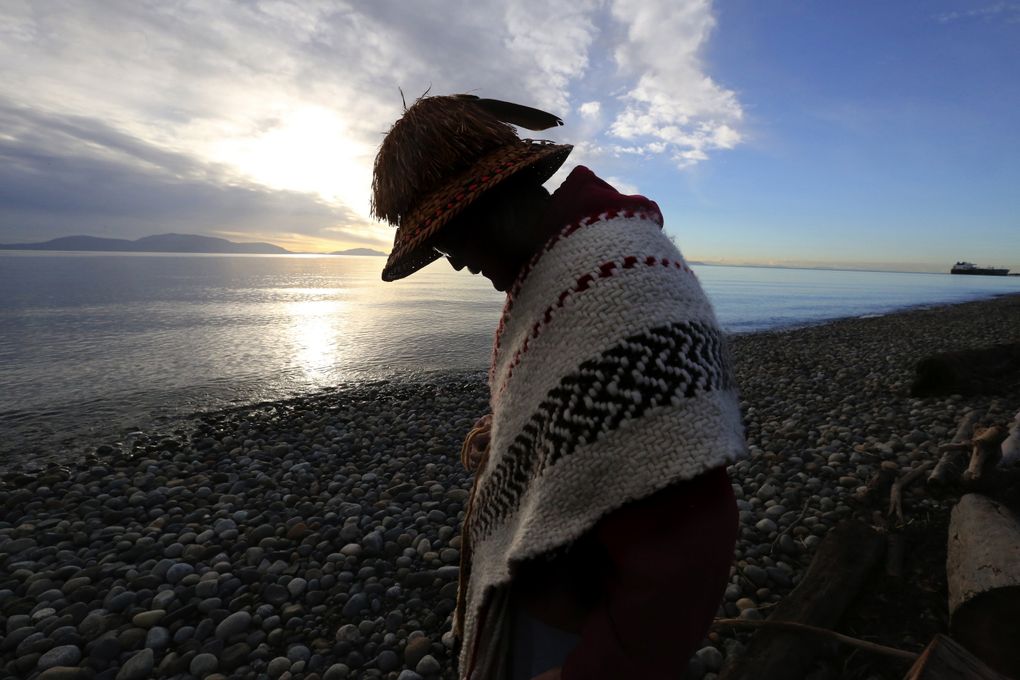
Northwest Tribes unite against giant coal, oil projects
As governments, tribal nations are uniquely empowered in some of the biggest environmental fights in Washington and willing to use that power.Seattle Times January 16, 2016 By Lynda V. Mapes
CHERRY POINT, Whatcom County — On this last bit of undeveloped coast between a smelter and two oil refineries, SSA Marine wants to build the biggest coal export terminal in North America, to load up some of the largest ships afloat arriving up to 487 times a year, mostly from Asian ports.
The blockbuster $665 million proposal is one of many fossil fuel transport projects under review in the region — from oil pipeline expansions in B.C., to oil-by-rail facilities in Southwest Washington and another coal port in Longview.
And while thousands of people have turned out to protest Washington turning into one of the largest fossil fuel hubs in the country, Northwest tribes appear best positioned to win the fight.
“This is different from an environmental group coming in and saying ‘you shouldn’t do this.’ Here, agencies’ discretion is limited,” said Robert Anderson, director of the Native American Law Center at the University of Washington School of Law. “Tribes have treaty rights and the U.S. has trust responsibility to uphold those rights. That is the game-changing possibility here.”
It’s a high-stakes power play. There’s already been blowback in Congress from Republican lawmakers and, if the tribes lose, that could create a bad precedent for them in future battles.
But tribes are standing together against the projects.
“Coal is black death,” said Brian Cladoosby, chairman at the Swinomish Indian Tribal Community near La Conner who, as president of the National Congress of American Indians, has brought a national voice to the opposition.
“There is no mitigation,” Cladoosby said. “We have to make a stand before this very destructive poison they want to introduce into our backyards. We say no.”
The Lummi Nation has demanded the U.S. Army Corps of Engineers, which is reviewing the so-called Gateway Pacific Terminal project, deny SSA’s permit application because it endangers the tribe’s treaty-protected fishing rights.
The Swinomish and Tulalip Tribes have sent similar letters to the Corps, and the Suquamish Tribe also is weighing in. “We have the same amount of commitment to treaty rights protection,” said Leonard Forsman chairman of the Suquamish tribe. “We are a team and we are working with them. We are very concerned about impacts on our fishery.”
The project is proposed in a state aquatic reserve and treaty protected fishing areas of five Washington Tribes. The uplands and waters are utilized by a menagerie of state and federally protected species, and what was once the best herring run in Puget Sound, already imperiled and targeted for recovery. The project also overlaps Xwe’chi’eXen, a village site and cemetery for at least 3,500 years and thousands of ancestors of the Lummi Nation.
The Gateway terminal would move up to 48 million metric tons of coal a year — enough to cover 80 acres in five open stockpiles by the water, each 2,100 feet long and up to 70 feet high. As many as nine trains a day more than a mile and a half long would travel to and from the terminal, all the way from Montana and Wyoming. Every 18 hours, ships, many nearly three football fields long, would load up on coal at the 3,000-foot-long wharf.
Booming across the water in a tribal fishing boat toward Cherry Point, Lummi carver Jewell Praying Wolf James said he traces his lineage to some of the first sockeye fishers with reef net sites here.
To him, and to tribal cultural leader Al Scott Johnnie, the fishery means more than money. “There is a sense of place, a sense of belonging and a culture of the water, the air, the plants, the fish, and how you conduct your relationships,” Johnnie said.
continued below~